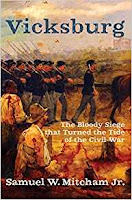• Vicksburg: The Bloody Siege that Turned the Tide of the Civil War
 Mitcham is a prolific WW2 historian who has recently moved to the Civil War sphere. I haven't seen his more recent Forrest book, but did review his 2012 Red River Campaign study, a treatment that I found problematic. His new book Vicksburg: The Bloody Siege that Turned the Tide of the Civil War takes a decidedly unconventional approach to the pivotal western campaign. In addition to constructing a narrative history of the campaign from the Confederate perspective, the author also mounts a wide-ranging defense of John C. Pemberton's much-maligned command performance.
Mitcham is a prolific WW2 historian who has recently moved to the Civil War sphere. I haven't seen his more recent Forrest book, but did review his 2012 Red River Campaign study, a treatment that I found problematic. His new book Vicksburg: The Bloody Siege that Turned the Tide of the Civil War takes a decidedly unconventional approach to the pivotal western campaign. In addition to constructing a narrative history of the campaign from the Confederate perspective, the author also mounts a wide-ranging defense of John C. Pemberton's much-maligned command performance.
From the description: "On July 4, 1863, Confederate Lieutenant General John C. Pemberton surrendered Vicksburg and the Army of Mississippi to Ulysses S. Grant. Pemberton was immediately denounced as a poor general, whose incompetence and indecision cost the South control of the impregnable fortress. Some Southern newspapers were especially harsh, pointing out that Pemberton was a Northerner (he was born in Philadelphia) and suggesting that treachery was behind the fall of "the Confederate Gibraltar." He was thoroughly lambasted as being a bungling fool, a poor leader and a hopeless general. Historians have generally followed suit. Forgotten in all of this is the fact that Grant attempted to take or bypass Vicksburg nine times. In five of these attempts, he was fought to a standstill and sometimes convincingly defeated by none other than John C. Pemberton, who was outnumbered 2 to 1 and sometimes more."
Any work seeking to counter the traditional view of Pemberton has a steep hill to climb. Many Vicksburg Campaign readers will perhaps recall David M. Smith's Compelled To Appear In Print: The Vicksburg Manuscript of General John C. Pemberton (1999), which I still consider one of long-defunct Ironclad Publishing's best and most historiographically significant releases. That book does not attempt the type of comprehensive rehabilitation of Pemberton's Vicksburg record that Mitcham seemingly tries to do here, but it does provide us with a fascinating window into at least understanding Pemberton's mindset and actions during the most critical phase of the campaign using the information available to the general at the time.
(1999), which I still consider one of long-defunct Ironclad Publishing's best and most historiographically significant releases. That book does not attempt the type of comprehensive rehabilitation of Pemberton's Vicksburg record that Mitcham seemingly tries to do here, but it does provide us with a fascinating window into at least understanding Pemberton's mindset and actions during the most critical phase of the campaign using the information available to the general at the time.


I would argue that the author, in the quote you provide, is giving Pemberton credit he did not earn. Of all the various schemes that Grant tried, the only one that I can think of in which Pemberton actually stopped Grant (as opposed to other commanders or terrain or the elements) was the Yazoo Pass expedition. Steele's Bayou, Lake Providence, the canal were all cases in which the terrain alone stopped Grant. The November, 1862 "overland campaign" was stopped by Van Dorn's Holly Springs raid. Sherman was defeated at Chickasaw Bayou by SD Lee.
ReplyDeleteEven after taking into account Pemberton's serious limitations to his freedom of movement (perceived or otherwise), I think it would be difficult to come up with a very convincing defense of Pemberton's actions once Grant was on the same side of the river.
Delete